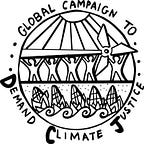Reclaim Power 2016!
Recapping a month of global action for energy transformation
This October, social movements across the world united for a month of actions with one single purpose: to confront the dirty energy industry and demand a clean, fair energy system.
The rationale was simple. Dirty energy is the single biggest contributor to climate change.
Addressing the climate crisis and tackling the injustice of energy poverty, means displacing the power of the dirty energy industry, and rapidly building local solutions. The mobilization carried six core demands:
The case could not be clearer, but the obstacles are significant. The dirty energy industry has tremendous weight in the global economy, benefiting from a staggering amount of private money and public funding.
But we have no choice. Reclaiming our future means reclaiming power from big polluters, and building it in our own movements and communities. These are just some of the actions that took place over the last month, hoping to achieve that goal.
Actions
Reclaim Power kicked off in London, where activists took part in a day-long marathon, aiming break the world record for the most protests by one group in one day, and to raise awareness of the city’s role in fueling climate change. They ended up almost tripling the world record, performing 62 protests over a 10-hour period. The protests targeted institutions implementing, enabling, or financing dirty energy projects, including extractive companies, multinational banks, lobby groups, private equity firms, consultancies, legal firms and public finance institutions.
In the Philippines, across 30 different sites in the country,thousands marched to demand the Duterte administration move away from coal and fossil fuels and shift to renewable energy.With 36 coal-fired power plants in the pipeline, Filipino activists aimed to raise awareness around the impacts of coal power on public health and the environment. In Davao City, various organisations held a caravan rally from Puan to Binugao Toril, the site of a major coal-plant.
In Germany, Ende Gelände activists protested against EPH, a Czech investment group investing in Lusatian lignite coal mining. They occupied Lusatia’s gargantuan coal pits, and demonstrated outside the headquarters of Vattenfall, previous investor in the coal mine.
In Australia, customers of ANZ, Commonwealth Bank, NAB and Westpac publically closed their bank accounts in protest over their continuing support for fossil fuels. Since publicly announcing their support for the Paris agreement’s two degree limit, Commonwealth Bank, ANZ, NAB and Westpac have loaned a combined $5.6 billion to fossil fuel projects around the world.
From Adelaide to Brisbane to Cairns, customers stood up to the dirty lending practices of the richest banks in the country. The actions took place under the slogan: “If you choose fossil fuels, your customers will choose another bank!”
Groups also took action to show solidarity with Haiti, wracked by Hurricane Matthew. As Haiti struggles from an inestimable loss of life and livelihood, activists from Young Friends of the Europe highlighted the link between fatal environmental disasters and the inaction of the world’s largest climate culprits.
During the month of Reclaim Power, the city of London hosted Oil & Money: the fossil fuel industry’s luxurious annual conference, where executives network, schmooze and discuss the most pressing issues facing the industry. Keynote speakers included the CEOs of mega-oil companies such as BP, Exxon Mobil, Total and Statoil, who are continuing to pour millions into new dirty energy projects.
A coalition of groups declared the conference a “crime scene”, and set up a symbolic forensic site at the hotel where the conference took place.
Across the world, anti-fracking organisations also took part in the Global Frackdown, an international day of action to ban fracking. From Australia to Brazil to Mexico, local groups organised events, stalls and actions to spread the word about the dangers of unconventional fossil fuel extraction, and demand a frack-free future.
Actions also took place across the UK to challenge Barclays Bank, a leading lender to dirty energy projects around the world, and the financier of fracking in Yorkshire.
Earlier in the month, groups mobilized at Heathrow, one of the world’s busiest airports, to oppose the proposed construction of a third runway.
Not only did Reclaim Power bring a range of actions, but it also triggered a wave of educational activities.
From Bosnia to Ecuador, groups organized Reclaim Power events to shed light on the climate crisis and the people-powered solutions to it. In Nigeria, Environmental Rights Action/Friends of the Earth Nigeria organised a one-day renewable energy conference in Abuja, bringing together civil society, government officials and community-based groups to critically address energy policy in Nigeria.
In Colombia, social movements from the regions of Córdoba, Santander and Antioquia came together for four days of reflection on dirty energy systems and clean, community-led alternatives. The communities actively built an alternative, expanding a solar battery in the Río Ciego community, which brought increased water access to forty families in the area.
Victories
Across the month of action, there have been plenty of victories. In the Philippines, protests against Korea’s EximBank, a historical financier of dirty energy, forced it to withdraw its bid to the Green Climate Fund.
In Scotland, campaigners have brought the government to ban underground coal gasification, a controversial type of fossil fuel extraction.
In addition, an online petition was launched and supported by a social media surge with a reach of over 3.2 million people. The petition will be delivered to governments at this year’s UN climate change negotiations — there is still time to sign.
What Next?
Climate justice movements around the world are continuing to mobilize, particularly around the 22nd Conference of Parties in Morocco. One year after Paris, it’s a major moment to increase the climate ambition countries take before 2020, to call for greater climate finance for mitigation and adaptation, and to demand justice for communities.
Reclaim Power will be back in 2017, continuing to fortify the climate justice movements and their demands for a global energy transformation! To get involved, email demandclimatejustice@gmail.com.
